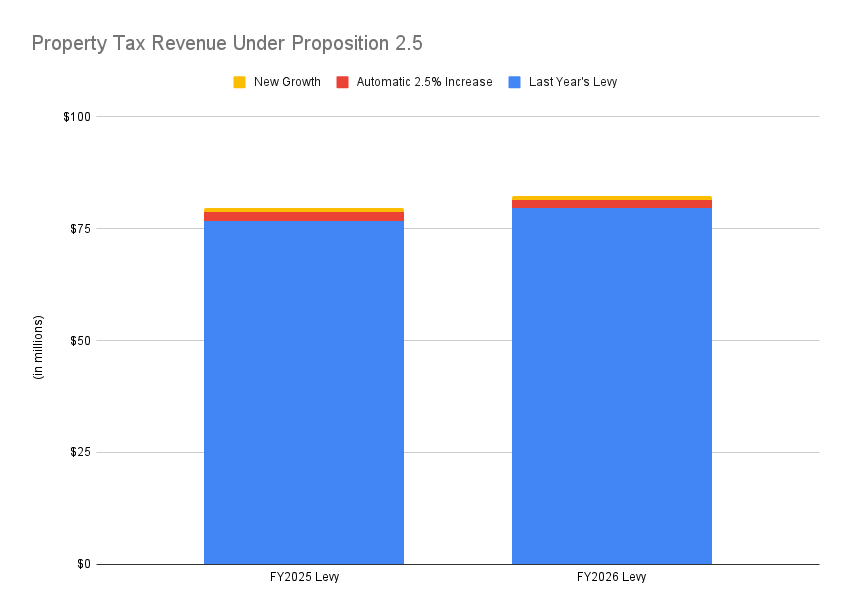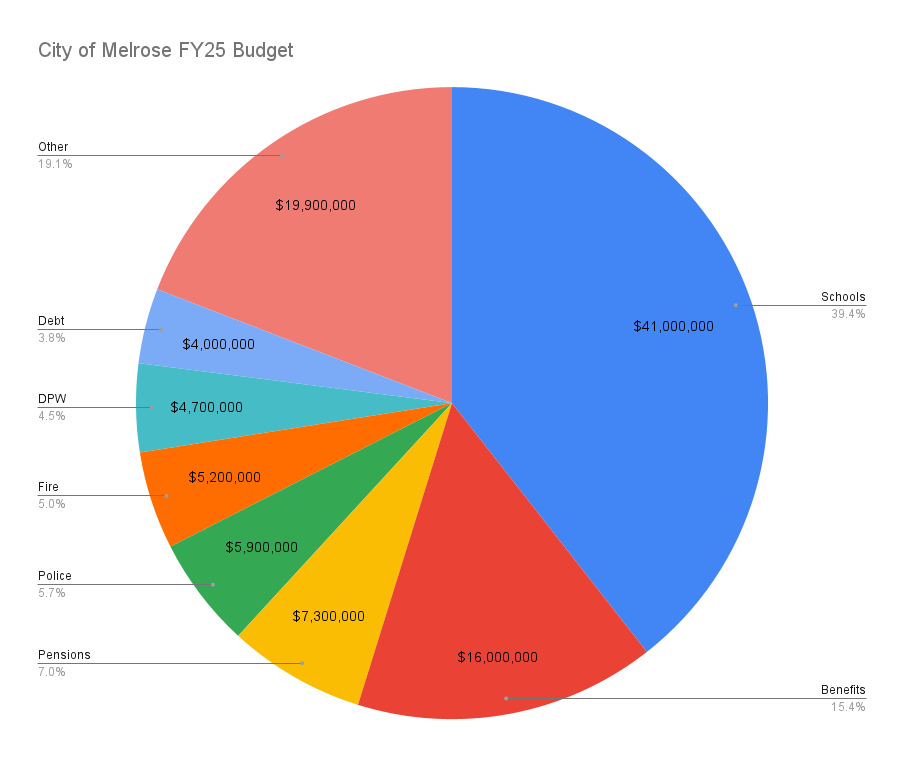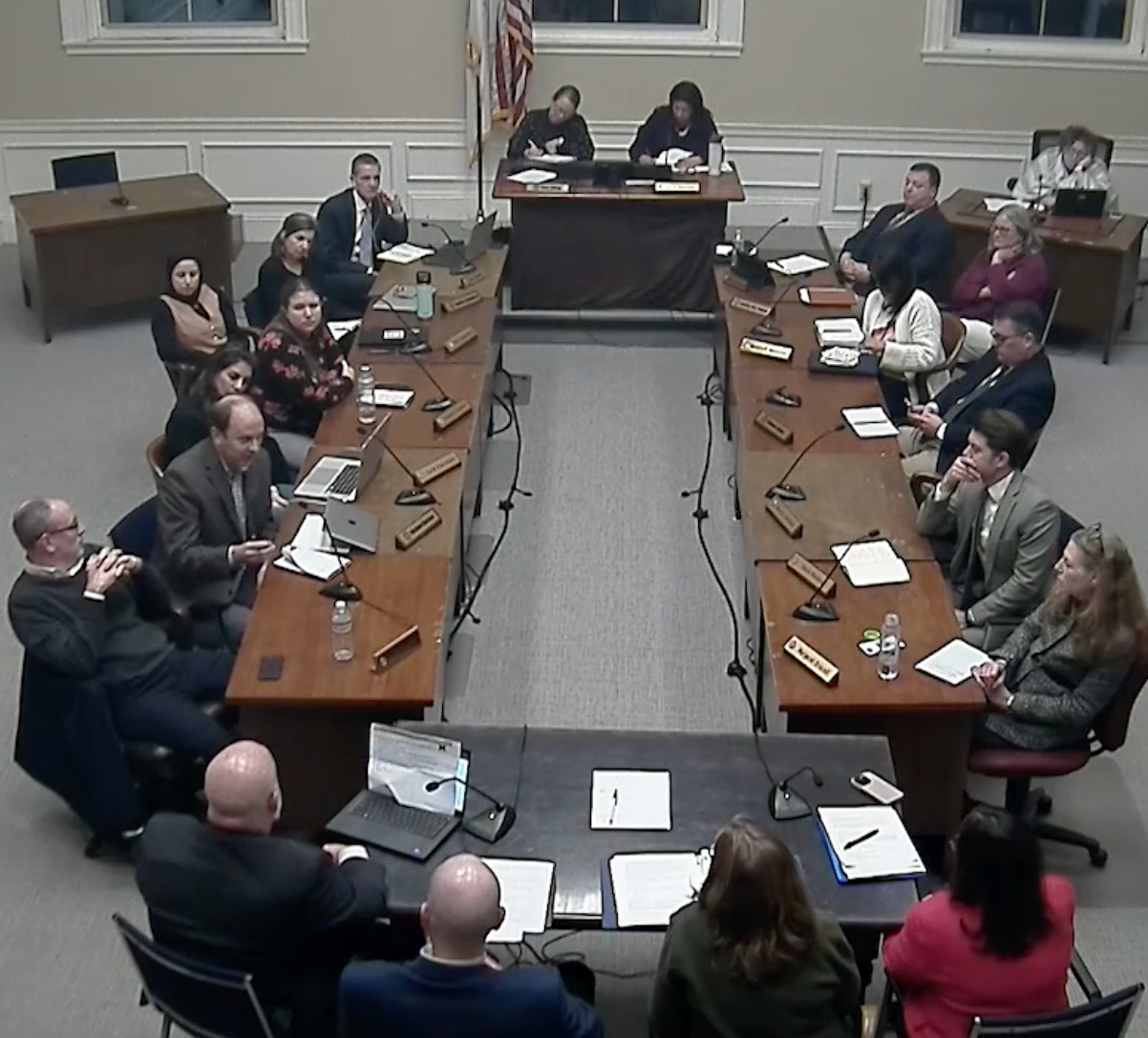City and Schools Facing Millions in Budget Cuts for Next Year
By Ellen Putnam

Left to right: Mayor Jen Grigoraitis, CFO Kerri Golden, Director of Finance Ken Kelley, and Superintendent Adam Deleidi
Screenshot from MMTV
Last night, the City Council and the School Committee held a joint meeting to hear about the status of the budget for the City of Melrose and Melrose Public Schools (MPS) for the remainder of Fiscal Year 2025 (FY25) and what the budget process will look like for FY26, which starts in July. Speaking to the full City Council and School Committee as well as a packed audience in the City Council Chamber, Mayor Jen Grigoraitis, Superintendent Adam Deleidi, and other officials discussed prospective budget cuts.
Based on rising costs in a number of areas and limits on the amount the City is able to raise in taxes, MPS will need to make $4.2 million in cuts relative to this year’s services, while the City will need to make $1.9 million in cuts, for a total of $6.1 million, which is almost 6% of this year’s total budget of $104 million.
Kerri Golden, the City’s Chief Financial Officer, explained that, heading into this year’s budget (FY25), many municipalities across Massachusetts were facing the same cost increases in sanitation, health insurance, special education, transportation, and utilities, and many needed to either pursue property tax override votes or make significant budget cuts, as Melrose did.
Going into FY26, Melrose is projected to receive new revenue of $2.6 million, including $1.9 million new revenue from property taxes as allowed by Proposition 2½, and a new growth assessment of $770,000 (also based on what is allowed by Proposition 2½). Golden noted that, on the City side of the budget, several costs are expected to increase significantly, including health insurance for all City and MPS employees, which is projected to increase between 8.5% and 12.5% this year.

Increase in the property tax levy from FY25 to FY26
Superintendent Deleidi shared that, due to contractual salary increases for educators as well as raises that individual staff members receive based on experience and professional education, staff salaries often increase by 4-5% per year. In addition, transportation costs and tuition for Melrose students who receive out-of-district school placements have increased at rates far outpacing the City’s allowable revenue increases, which has led to the $4.6 million deficit MPS is currently facing going into FY26.
“When I interviewed for this job,” Superintendent Deleidi said, “I said numerous times that my goal would be to help make Melrose Public Schools a world-class public school district. And at this point,” he went on, “rather than working toward making Melrose Public Schools a world-class public school district, we’re struggling to meet federal and state compliance.”
School Committee Member Matthew Hartman noted that there are multiple layers of compliance that MPS must meet, including at the state and federal levels. Students with special education plans must receive the services specified in their Individualized Education Plans (IEPs): this can include support from a paraprofessional in the classroom or special education services outside the classroom, which MPS is required to pay for. Students with disabilities whose needs cannot be met within MPS are entitled to an out-of-district placement, and MPS must pay for their tuition, which in FY25 is, in total, over $5 million for this group of students.
Additionally, MPS is required by law to provide transportation for students who receive an out-of-district placement, are placed in foster care, or become homeless. MPS Director of Finance Ken Kelley noted that an MPS student recently became homeless, which will result in an additional $12,000 in transportation costs for the remainder of the school year. “This is double-edged,” he explained, “there’s a youngster out there who’s having a real struggle, and we want to support that, but it’s also something that we were not able to plan for.”
Speaking about what cuts will need to be made in order to close the $4.6 million deficit, Superintendent Deleidi shared that he will be suggesting cuts “based on what’s least harmful to students and families.” While drastic options like closing a school would be a last resort, he shared that MPS is looking at approximately a 10% reduction in force, or laying off 40 teachers and 5 administrators, which will significantly raise class sizes across the district and may result in some students being moved to a different school.
Superintendent Deleidi also talked about the gap between what is currently happening in MPS and what “a world-class public school district” would look like. To achieve that goal, Deleidi said, MPS would need “to have systems and structures in place to develop teachers,” which is currently not feasible, given that the professional development budget was cut ahead of FY25 and the district currently has only two curriculum directors. Superintendent Deleidi noted that he himself has been leading professional development sessions for math teachers, which, he admitted, “is not typically the role of the Superintendent.” Going into FY25, a number of roles were cut that provide this kind of development for teachers in most school districts. Deleidi noted that, in order to add back the positions that he believes are needed for MPS to be successful, an additional $2.7 million would be needed, on top of the $4.6 million required to maintain FY25 operations into FY26.

Segments of the City of Melrose budget for FY25
Note: The figure for Schools does not include offsets (fees, tuition, etc, collected by MPS), which are kept in the MPS budget. The total budget for MPS in FY25 was $47 million.
In addition to the deficit within MPS, Mayor Grigoraitis shared that the City will also be looking at $1.9 million in cuts. A large percentage of the City’s budget is based on contractual obligations, including health insurance, pensions, and minimum staffing requirements for the public safety departments, so these cuts will mostly be to discretionary services. To provide context for what these cuts in services might mean, the mayor noted that closing the library for the year would save $1.2 million, while the Milano Center’s annual budget is $250,000. “You have a handful of departments that are operating around the $1 million mark,” the mayor explained, “but most that are operating on a couple hundred thousand dollars. Once we peel back the things that we have to pay,” she went on, “we’re left with the things that people think about when they think about city services” - filling potholes, mowing grass, keeping the library open - “and it’s going to be really hard to get to $1.9 million because none of those budgets alone are very big.”
Mayor Grigoraitis also spoke about the human component of these cuts: “We’re talking about almost 800 people between the City and Schools. We’re talking about their jobs. These are our colleagues. So when we talk about cuts, these are really hard conversations.” Massachusetts is currently experiencing shortages in applicants for teaching and public safety positions, and Melrose already struggles to attract educators for open positions due to Melrose’s lower pay relative to its neighbors. Once employees are let go, it may be difficult to replace them once the City returns to a stronger financial position.
The City’s financial situation is further complicated by what is currently happening at the federal level. Mayor Grigoraitis noted that the City of Melrose receives between $2 and 4 million in federal funding in the form of education grants as well as discretionary grants for projects like a stormwater management project at Ell Pond, and an adjustment counselor at MHS. “We have been very aggressively going after grants,” the mayor explained, but following the federal freeze on grant funding last week, which has still not been fully clarified at the federal level, “grants are not a sure thing.” When the City signs a contract with a vendor, the City is “on the hook for that money,” Mayor Grigoraitis explained, whether or not they are reimbursed by the federal government. “We are monitoring the situation very closely,” she went on, “but we are also recognizing it’s less likely to be an avenue for us in the future.”
For FY25, the City included 85% of local receipts in the budget, which Mayor Grigoraitis noted is the maximum recommended in order for the City to maintain its credit rating. Local receipts, which include sales tax, vehicle excise taxes, and building permit fees, are a major component of the City’s free cash fund, which is currently used for capital expenses as well as emergencies. While the effects of this shift on free cash will be delayed, the mayor noted that by FY27, free cash will be significantly diminished.
Several City Council and School Committee Members brought up the possibility of an override vote to close the budget gaps. Last June, an override vote that would have raised property taxes by $7.7 million was rejected by Melrose voters, 45% to 55%. Turnout in that election was 44%, but some proponents have suggested that turnout on the “Yes” side was depressed by the fact that it was a special election held after school had let out. In 2019, Melrose voters did pass a $5.18 million override to fund the MPS budget.
What is a Proposition 2½ override? We wrote about the mechanics of Proposition 2½ ahead of last year's override vote, which you can read here.
“There’s a misnomer that the 2019 override didn’t work, but it did what it was supposed to do,” said City Councilor Mark Garipay. “The numbers just don’t work.”
“These are fundamental, foundational systemic gaps,” agreed School Committee Member Jennifer McAndrew. “This is the difference between rising costs, including labor, which are deserved raises for our staff, against flat revenue over time. Those lines are not moving in the right direction, and the gap is growing.”

Joint Meeting of the City Council and School Committee
Screenshot from MMTV
“The reason we are in this predicament over many, many years,” McAndrew went on, “is because of Proposition 2½. If you go back and look at the rhetoric at the time, it was very much a story of local control. Live within our means, sure, but actually, our means are up to us. We get to decide what our means are. We did a successful override in 2019, but that’s 6 years ago now. This needs to be a regular thing in order to be closing these gaps. Pretty soon we’re not going to be talking about closing a school or a fire station, we’re going to be talking about how many schools and how many fire stations.”
Asked when an override vote could be held, Mayor Grigoraitis said, “I think we need to look really critically at how much time we need to get a successful override through. It was a pretty clear defeat in June. There can be a variety of dates on the table but I think the reality for this community is we’re looking at November of 2025.”
One proposal that has been suggested by some community members is to provide additional funding for the schools on a voluntary basis. Melrose did set up a voluntary tax donation fund for educational purposes over 20 years ago, in compliance with state law. In the 23 years it has existed, the fund has collected $15,000. The City is currently working on recruiting residents to serve on a committee to disburse the funds.
“I’ve had lots of outreach from individuals, offering to ‘pass the hat,’” said Superintendent Deleidi. “It’s great that people want to help, but are you on the hook for doing that every year after that? We can’t rely on that, and we’d rather do it through formal structures. And that mirrors the human resources as well. We have lots of people who are willing to donate money, and we have lots of people who are willing to donate their time, but at any point, they could say ‘I’m not doing that anymore’ and we can’t replace them.” Volunteers currently support significant aspects of MPS operations; for example, the elementary school libraries have been run entirely by volunteers for years.
“We are at a moment in time,” said Mayor Grigoraitis, “when, I think, it is about investing in ourselves at the local level. I think the federal financial picture is very chaotic and uncertain, and I think the state is probably going to be backstopping federal funding, so they’re looking at communities like Melrose and saying you kind of need to figure it out on your own. It’s about creating a community where people want to come and live and work,” she continued, “and that’s going to take sustainable investment.”

Mayor Grigoraitis and CFO Golden
Screenshot from MMTV
Members of the public spilled out into the hallway as the meeting progressed, and thirteen parents, teachers, and community members shared their thoughts during the public comment period. Parents of rising kindergarteners shared their worry and frustration after hearing from Superintendent Deleidi the previous night at a informational event that kindergarten class sizes in the district would be growing to 25 or more students per class. “It was a bleak night,” reported one parent. “It was really depressing,” said another. “A lot of people left very sad and worried.”
Leslie Means, the president of the Melrose Educators Union, said, “I’m very worried about how we come back from what we know is coming next year.” Joellen Beaudet, the vice president, recalled the early 2000s, when both the Beebe and Ripley schools closed, and said the current situation “sounds like giant steps toward redistricting and school closures. In this vibrant, sought-after city,” she went on, “we should be renovating schools, opening schools, innovating schools. I don’t know how much longer we’re going to be able to hold our heads up high and pat ourselves on the back if we are again preparing to close another school. We can’t be proud when we are cramming kids into classrooms like cattle and expecting their teachers to continue to do this hard work with vanishing resources and no support.”
“We as a community need to wrestle with the fact that the last override was not successful,” shared one community member, “in large part because of the mistrust in parts of our community with the ability of the City to manage its finances. This room is energized, it is ready to act, to campaign, to talk to all of our neighbors, but we need your support to also communicate to the people not in this room, those who may be skeptical of the need.”
“Let’s be real,” said another parent, “this year sucked. What’s next year going to do?”

Follow Us: